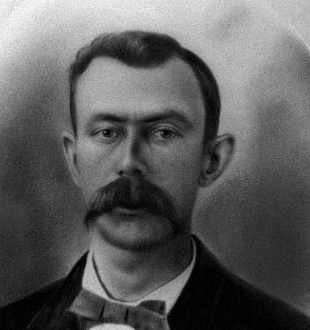Born on this day in 1848 in Monmouth, Indiana, Wyatt Earp grew up to be a man always on the move. True to his vagabond spirit he worked as a railroad man, a saloonkeeper, a gambler, a gunslinger, and a law man. From the lips of a family patriarch, he heard the following words: "Nothing counts as much as blood, the rest are strangers."
Writer and director Lawrence Kasdan quotes that line in his film Wyatt Earp (1994), in which his us-against-them philosophy brings this legendary cowboy both bane and blessing. Star Kevin Costner sits easy in the saddle in this scrappy sagebrush saga about one of the most famous gunmen of the Wild West. A legend for his rigorous sense of right and wrong, Earp and his brothers, who worked with him, were still prey to the lure of money. They sought it in Tombstone, Arizona, where the shootout at the O.K. Corral illustrated the primacy of violence in his life.
Earp's real life and the many stories about it illustrate some persistent elements of the myth of the American West — the need to be on the move, the resilience to adapt to new opportunities, and the dualism of the good guys versus the bad guys.
To Name This Day . . .
 Spiritual Practice
Spiritual Practice
"Why is there so much greed, folly, and violence in the world? The Zen answer is that because our bifurcating intellect and our five senses deceive us into postulating the dualism of self and other, we are led to think and act as though each of us were a separate entity confronted by a world external to us."
— Philip Kapleau in Awakening to Zen, edited by Polly Young-Eisendrath and Rafe Martin
Despite the glowing portrait of him in Western legends, Wyatt Earp led a life of greed, folly, and violence. The question is, are we so different from him? Spend some time on his birthday reflecting upon the mover, the gambler, the gunslinger (there are many kinds of "guns"), and law man in you. Then try to practice openness to all parts of yourself. Belleruth Naparstek explains it in this way:
"Heartful practice is about keeping the heart open to the world around us — to people, places, ourselves, and the Divine. It means coming from a place of empathetic attunement. It's about seeing the connections, the interlocking webs of energy among people and things, and residing as much as possible in the place of no separation."
